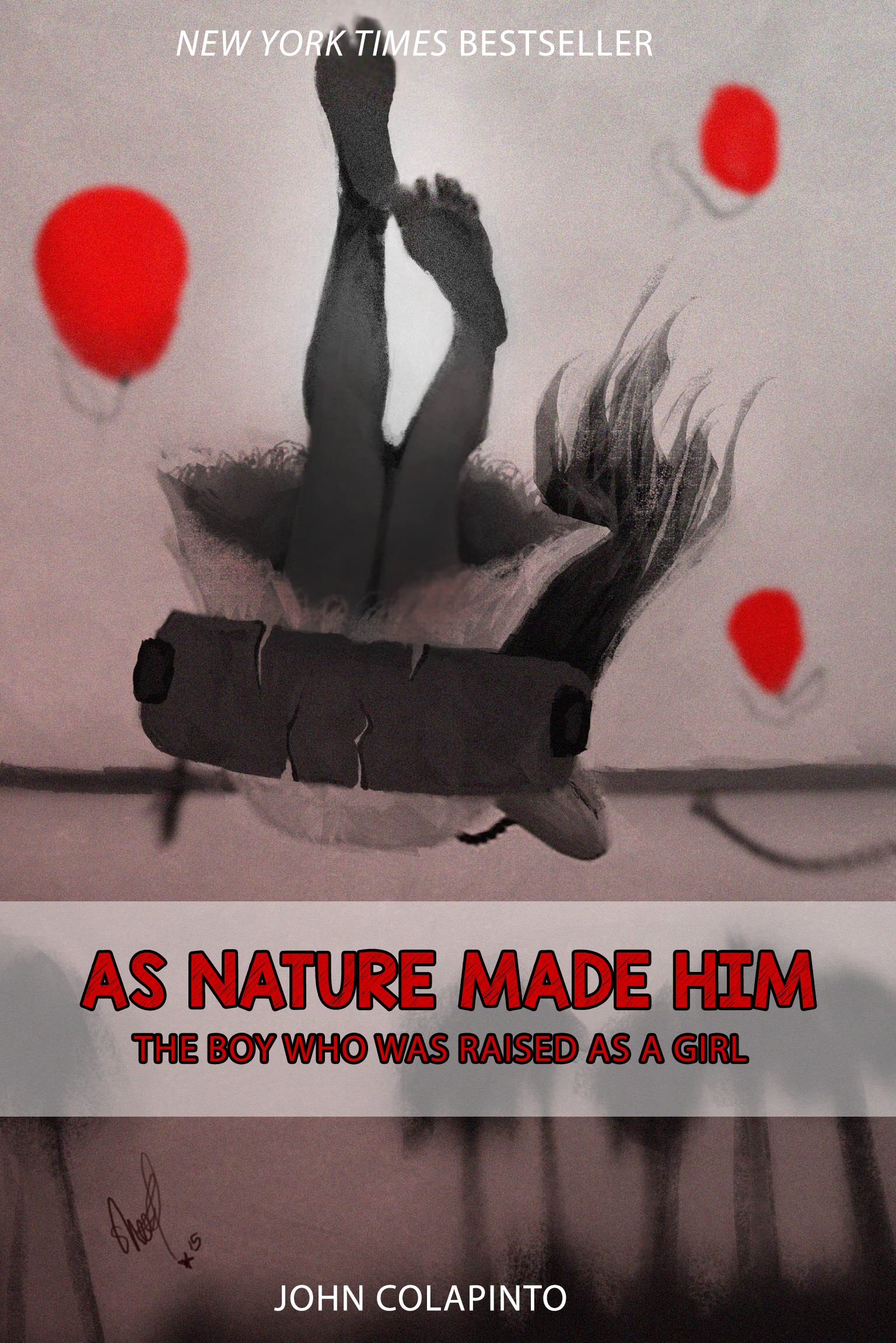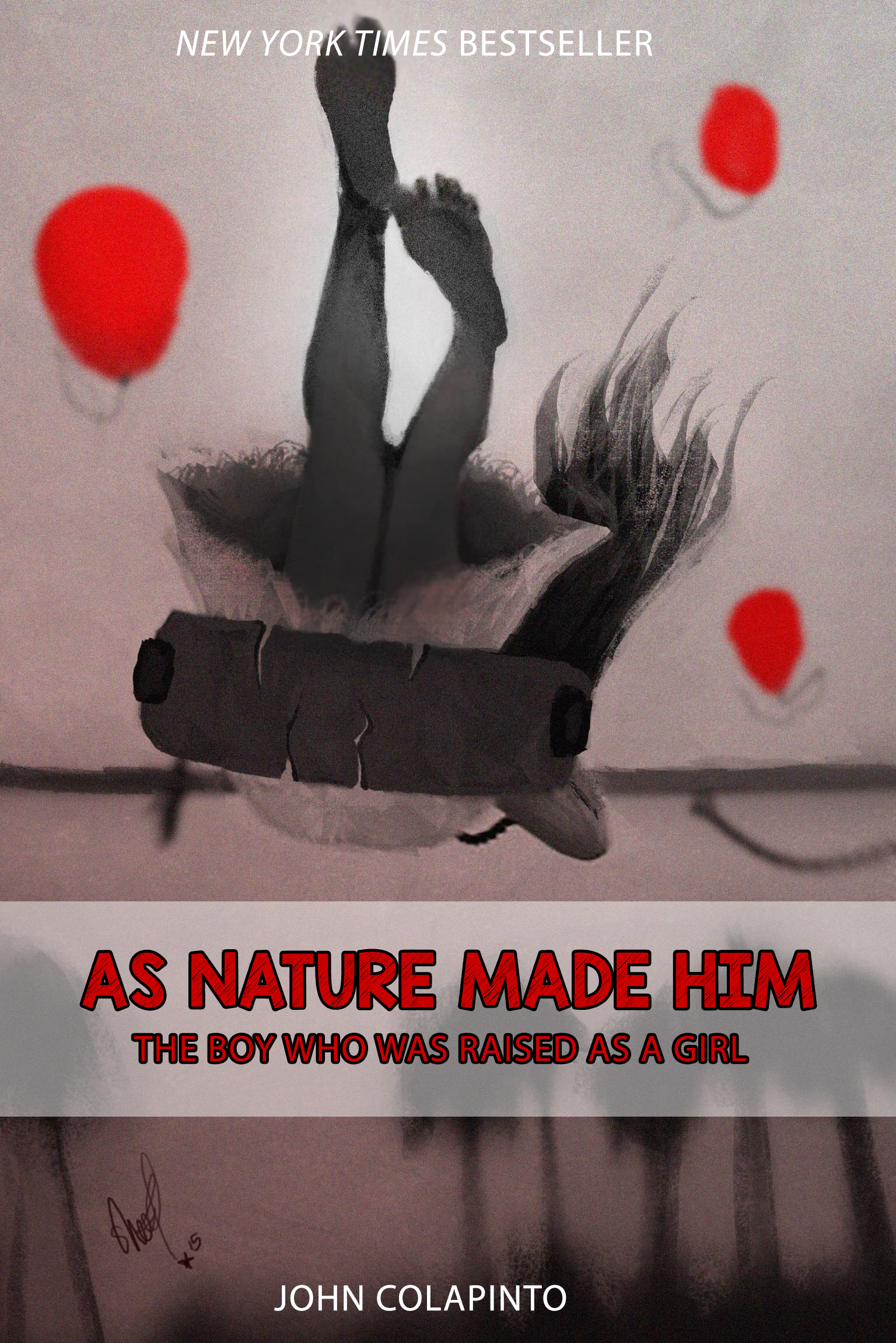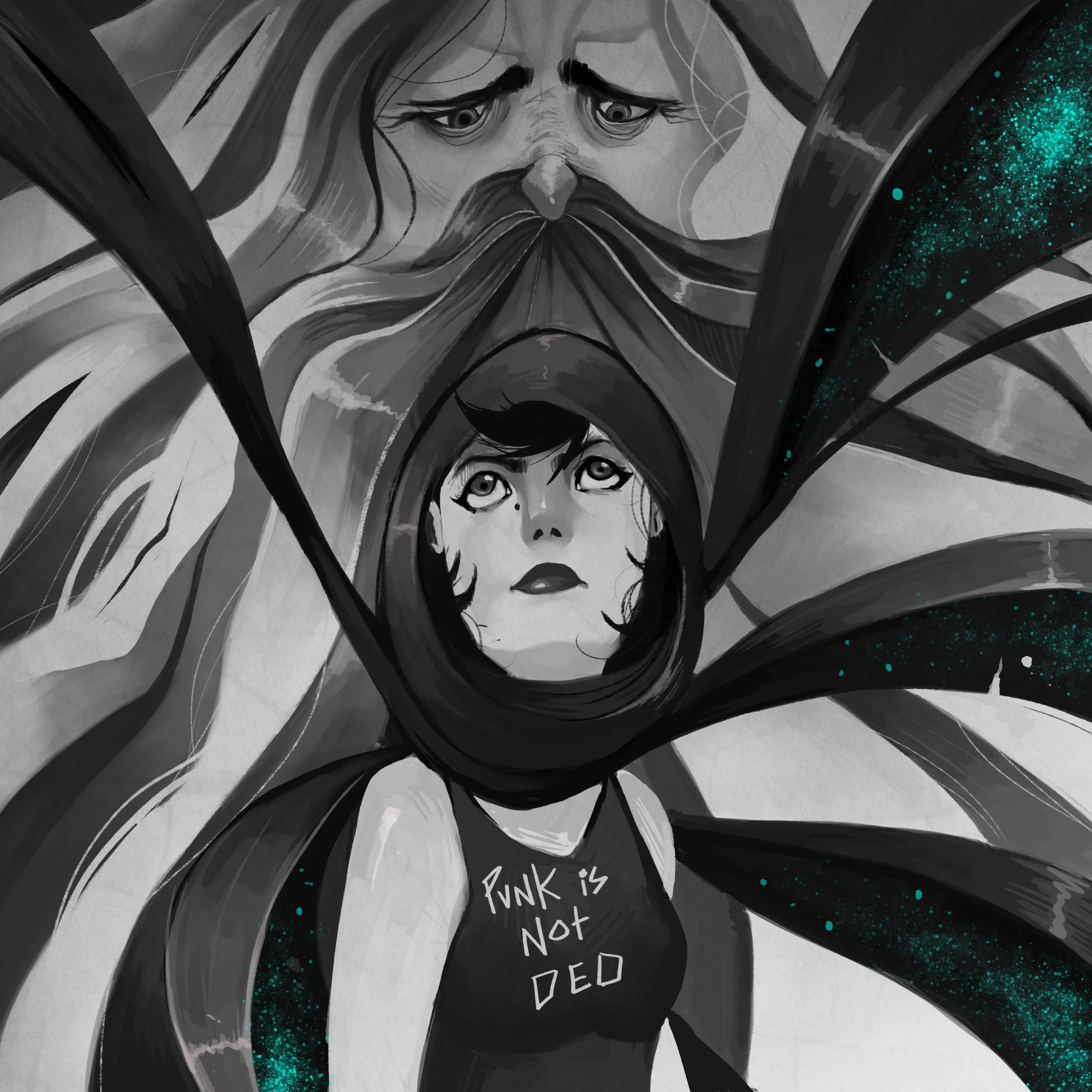Book Club: As Nature Made Him (+ August Book Pick)
 It's been six months.
It's been six months.
Six.
Whaaaat.
And I thought I couldn't follow through with anything. But I can. Here I am. I'm here. We're here. All of us. Together, as one.
And we read As Nature Made Him: The Boy Who Was Raised As a Girl by John Colapinto (which I initially spelled Calapintino, so there you go).
Our Review
No Spoilers
This was another one of those educational reads, the way Persepolis was for those who didn't grow up in Iran during the time of the revolution. It was very fascinating to see how things were back then, and the politics that affected things happening. In the same regard, it was very fascinating to see where the field of sexuality as a science was in the 1960s, when Brian and Bruce Reimer were born. The difference between this book and Persepolis, however, is that instead of seeing everything through the eye of an adolescent protagonist, the tale is narrated from a completely removed point of view outside of the events. John Colapinto, an award winning journalist, compiled the book from interview tapes, reports, and transcripts (reminds you of something?). No fluff, just facts. Also, while the main focus of the book is obviously Bruce/Brenda Reimer, Colapinto still took the time to review every new character that entered the baby's life, especially the man who'd cared for and reported on the Bruce/Brenda case for most of the child's life, Dr. Money. So this branch out gave the book an extra oomph, because you get a better picture of how the world worked back then, the way people regarded gender identity, sexuality, and medicine. The matter-of-fact detailed narration has put off some. namely, Ali Haji, who decided after reading the Preface and the first chapter that he hated the writing style enough to stop reading altogether, and understandably so, because this isn't a typical novel; this is academic research that is presented in story-like chronological fashion. The rest of us carried on my wayward son into the book and enjoyed the objectivity and sometimes painful details. This book will massage your brain, it will open up your eyes to events you had no idea happened, even though said events had immense impact on pop culture (which is detailed in the book). This book will punch you in the heart. It's good.
WARNING:
If you're going to read this book, and we suggest you do, BE WARY OF THE PHOTOS. In the physical copy of this book, there are a few pages of photos halfway through the book. DO NOT go through the photos until you finish the book. Unfortunately, Reem Aseeri went through these photos and it drove her into a blind rage, because it spoiled events that she didn't read about yet. They had such a blatant disregard for the fact that SHE WAS ONLY HALFWAY THROUGH THE BOOK WHY WOULD YOU SHOW HER EVERYTHING?!! UUUUUGH. So she got exposed to spoilers, and thusly decided to lower her rating of the book in understandable rage. It's one thing for assholes to spoil things for you, but for you to spoil your own book? WHY would you do that to your readers, John Colapinto's publishers? WHY? FUCK. IT'S NOT OKAY.
Sigh. She still continued through the book and finished it, even enjoying it, but unable to wash down the bitterness of a tainted experience.
Be warned.
Plot Pace
As is the situation with many of the books we read, specifically Blankets and a bit of Persepolis , there seems to be a discrepancy in the pace of the plot. Writers always seem to spend forever in the beginning of the story, but zoom past through the end. It just doesn't sit well, especially since this is a real story. You're not going to lie to me and make me think that life suddenly became a montage of events. Where are your details? It's just bizarre because there's always a turning point in the story, and then the main character suddenly leaps from one state in life to a completely new state in life as if it were a breeze. It's not that big of an issue, but it felt inconsistent. Having devoted so much of ourselves to the characters of this book, having grown up with them, it was important for us to settle with them into whatever lifestyles they settled in. It didn't ruin the story or anything, it just left us wanting more in-between details.
In addition, we were introduced to a lot of new cases and characters closer to the end of the book, and most of us felt that it was ineffective due to our place in the plot. It's harder to digest so much new information when you've already gotten so far into a book and know that it's about to end. That being said, I do understand that we needed to be at a certain place in the plot to accept this new information about other patients and research cases, because they would have been irrelevant if they were introduced earlier in the book. Still, I can concede that it was overwhelming, and it took an extra nudge of effort to really give them the attention that they deserved. They're pretty eye-opening and interesting cases, regardless.h
Details
John Calapinto is not cheap on details. In the first chapter, he narrates an event with such gruesome detail, that I'm pretty sure he found it funny. It was tough, the first chapter really tests you on your ability to withstand what this book has to offer. That being said, it's so important because he's providing facts from different points of view, as if to say that the fickleness of human condition is essentially what lead to the unfortunate events of this book. No one really is bad or good. Well, until we get to Dr. Money. It's hard to say whether Calapinto deliberately tried to frame Money in a bad light, or that there were just so much information pointing in that direction, that it was hard to say Money was anything but an asshole.
Themes
Gender Identity and Sexism
Probably the main theme that lurks in the back of your mind as you're reading the book. Gender identity is a clear one, as the main character struggles to develop a sense of self, and as the entire culture around him/her tries to enforce the idea that there two mutually exclusive groups of traits that any one person is allowed to cling to. Can a child know that they are inherently one gender or another? If parents weren't so obsessively occupied with what gender stereotypes their baby fits into, would they even notice a 'masculine' baby from a 'feminine' baby? Who the fuck gets to decide, and why does it always seem like a black and white decision? This is slowly making me angry, as I think about the traits that characterized both genders in this book. It's not the writer's fault, obviously, because this is simply people's perception of gender at the time (60's-70's). That being said, as time went by and we slowly started drifting into the 80's and 90's, nothing seems to change. No one ever said, "hey, remember when we thought we had to force girls to knit and ban them from wrestling in order for them to be truly girls? That was dumb, huh?" It's bizarre, because as the characters develop and grow out of their limiting mindsets, there is no reflection of the society around them growing out of it too. The medical and psychology fields' changes are clearly documented, but has the outside world really stayed the same? There seems to be no recognition by the author on the cultural shifts on the issue of gender identity. Yes, more intersex people are speaking out, but in a place where no one seems to be listening. Colapinto also didn't acknowledge that these gender stereotypes were sexist. I get that it's a given, but in his collection of research and data throughout the book, he didn't even have one scientist, one statement in an academic paper, or one interviewee who said, "We didn't realize how much it was bullshit to force girls into dresses and ban them from wearing pants." You know what I mean? Not one mention of it, really?
Nature Vs Nurture
Obviously, right? Anyone with half a brain can tell you that human behavior is not exclusively nature or exclusively nurture, that it's actually a mixture of our biological makeup (nature) and environment (nurture). This is how we know that Dr. Money was a radical from the beginning, because he subscribed to the nurture-only side, and it was his gospel. Still, he didn't get to where he was without making some very valid points about the importance of environmental and social factors on human behavior and gender identity. So it sucks to see that, by the end of the book, there's an implication that one side of the argument is more dominant than the other side, which I don't think is fair. While a significant amount of research conclusions have been shown to be not only flawed, but falsified, the same could be said about research on the opposite end of the spectrum. To give the author credit, he's not here to solve the Nature VS Nurture debate, he's here to present a case and all the research around it. He does also emphasize that deciding how to treat intersex children is not a black and white issue, it's a huge grey area with so much data left unresearched. The conclusion is that it's a big shrug for both the medical field and for psychology, but shrugging and scratching your head is better than pretending you know the answer.
Character Development
Brenda Reimer
We watch Brenda as she grows up with an identical twin brother, confused and depressed for most of her life. While there are changes to her status as she grows up from a confused toddler into a confused teenager, we didn't get to see character development when it counted. I mentioned earlier that the pace suddenly speeds up around the end of the book, but that's exactly when we needed to slow down and actually see Brenda develop from a confused child into someone who's more self-aware and has taken control of their life. We skip to that, and I don't think that that's fair. And by the time you finish reading the book, you wonder, did Brenda ever change at all?
Dr. Money
It's funny that Dr. Money becomes the antithesis of Brenda Reimer by the end of the book, because he's exactly like Brenda in terms of character development. With Dr. Money, we didn't feel like we skipped through some pivotal events in his life, but the change of society around Dr. Money is much more explicit than the change (or lack of change?) of society around Brenda. You watch as Dr. Money goes from hero to zero, as they say, but notice that he stays exactly the same in terms of character and mindset. If anything, the changes around him seem to exacerbate his qualities and bring them to the forefront of his interactions with the world, pushing away his superficial charm which got him to godlike status in the first place. Speaking of superficial charm, I have to bring up the fact that, as you read about the experiences of Dr. Money's patients, it becomes clear that Dr. Money is a cult leader. A scientific cult leader? Either way, he reads like a text book cult leader in every single way possible, down to the self-victimization and mindless worshippers. It's scary because you can dismiss cults as a group of nutjobs that you'd never fall for, but would you be able to spot doctors, researchers, and scientists who charmed their away into academia? He was on Oprah, wrote articles for Cosmopolitan, published 2,000 pieces of writing in the subject of sexuality and sexual identity, and received 65 honors/awards from around the world. You never know.
TL;DR Our Review
Bader: 3 Stars
Noor: 4 Stars
Reem: 3 Stars
3.3/5 Stars
AUGUST BOOK CLUB PICK:
The Little Prince by Antoine de Saint-Exupery (1943)
Translation by Katherine Woods
- Children's Fiction, Fantasy, Classics
THANKS FOR READING IF YOU ACTUALLY READ EVERYTHING!
Let us know what you think. Do you hate us? Do you disagree with every single thing I said? TELL ME.
Check out our Instagram: @Shda3wa







